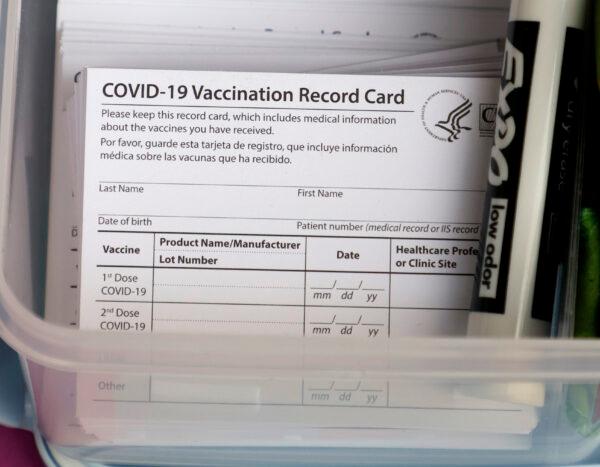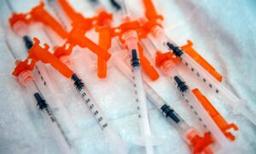CDC Ends COVID-19 Vaccination Cards
The U.S. Centers for Disease Control and Prevention (CDC) is phasing out its COVID-19 vaccination cards, according to an Oct. 4 update on the agency's website.
Considered a controversial relic of the COVID-19 pandemic era, the white cards once determined who could and couldn't participate in society to some degree, such as by barring or allowing entry to businesses, schools, and workplaces based on vaccine status.
Similar requirements became commonplace and controversial around the world, prompting criticism in some places of a two-tiered economy.
Now, the CDC has stopped printing the cards because the federal government is no longer in charge of COVID-19 vaccine distribution. From the height of pandemic restrictions in late 2020 to May 10, the federal government sent out more than 980 million cards, according to the agency.
"CDC no longer distributes the white CDC COVID-19 Vaccination cards and does not maintain vaccination records," the CDC stated in the updated frequently asked questions section of its website. "Contact your state health department’s immunization information system (IIS). Your state’s IIS cannot issue you a vaccination card, but they can provide a digital or paper copy of your full vaccination record, including your COVID-19 vaccinations."
With their necessity long since a thing of the past, federal and local health officials don't expect the discontinuation of the cards to be a particularly big change.
In 2021, after President Joe Biden announced vaccine mandates, the ubiquitous white cards spawned a black market industry, and U.S. authorities declared some actions in service of that market illegal. New York even made faking a vaccine card a Class D felony in December 2021, with violators of the new state laws facing anywhere from probation to seven years in prison.
That year, the FBI stated that buying, selling, or using counterfeit COVID-19 vaccination cards was a crime and that violators would face a fine and up to five years in prison. U.S. Customs and Border Protection also blocked shipments of fake cards coming from China.
In a recent case, a former Chicago pharmacist was found guilty in federal court for stealing and selling authentic COVID-19 vaccination cards on eBay in June.

What's in Store for Proof of Vaccination?
The cards will remain valid as proof of vaccination. But in the future, people will need to request their immunization records from the health department, a clinic, or a pharmacy as they would for any other vaccine.Heidi Gurov, a nurse consultant at the Wyoming Department of Health, advises people to treat their vaccination cards like any other important health record and recommends keeping them in a "safe spot."
Across the nation, states and certain cities maintain immunization registries, but the procedures for record inclusion and access can vary. Notably, immunization records from the mass vaccination efforts during the early pandemic days are usually stored in these registries, depending on the particular state's regulations. There's no unified, nationwide immunization record registry in place.
States vary in their approach to immunization records. For example, in Texas, patient consent is required, while places such as Wyoming and Philadelphia have providers log vaccinations. Many states offer digital records through apps or websites, allowing users to save certificates or QR codes as proof of vaccination, with some providing tracking and reminders for future doses.
“One of the positives [during the pandemic] was having increased autonomy on your patient record, especially the immunization record,” said Jeff Chorath, who manages the immunization information system in Washington state.
One who's lost his or her vaccination card can usually request immunization records from the place that administered the vaccine or through a state registry. Some states also offer digital vaccination cards.


No comments:
Post a Comment